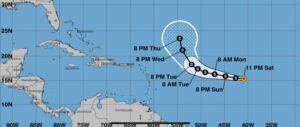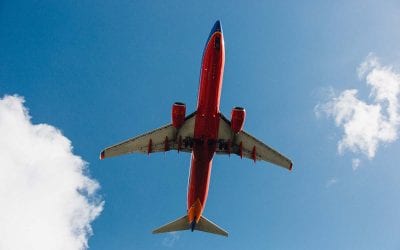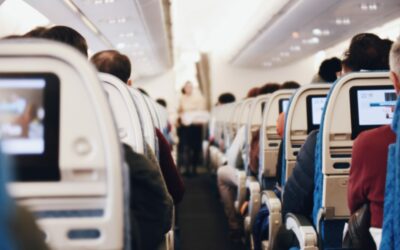With a more active hurricane season than normal, many travelers want to know if cruising during the hurricane season in hurricane belts across the globe is safe. I’ve got the answers for you here.
 It is hurricane season. Hurricane Ophelia is bearing down on my hometown region as I write this column. We’ve had winds running about 17 mph, gusting much higher. Most of the day we’ve had soaking rains.
It is hurricane season. Hurricane Ophelia is bearing down on my hometown region as I write this column. We’ve had winds running about 17 mph, gusting much higher. Most of the day we’ve had soaking rains.
Ophelia brought a phone call from a friend asking if it was safe for him and his wife to go on their upcoming Caribbean cruise. He was thinking about cancelling. With the National Oceanic and Atmospheric Administration (NOAA) predicting an above normal Atlantic/Caribbean hurricane season that generally peaks about now, it’s a question that many are asking.
The short answer is yes, it’s safe to go on a cruise during hurricane season. Let’s understand why cruises during the hurricane season are safe, and how to plan for cruising during the season.
When does hurricane season occur in the Atlantic, Caribbean and the Pacific and is it likely your cruise will be affected by one?

The Atlantic and Caribbean hurricane season runs from June 1 through November 30. The season typically peaks from August through early October, and September is generally the most active hurricane month. The Pacific hurricane season starts on May 15 in the eastern Pacific and two weeks later in the central Pacific. The hurricane season in both Pacific areas ends on November 30.
Is it likely that your cruise will be affected by a hurricane during the season?
NOAA has predicted an above-normal Atlantic/Caribbean hurricane season, having from 14–21 named storms. So far there have been 16 named storms in 2023. Even with 21 named storms in the five-month hurricane season, normally few cruise ships would be affected by them.
Ships can out-run hurricanes in an emergency and don’t ever try to ride them out.
How do ships generally handle cruises during a hurricane?
Unlike land locations which have no choice but to endure hurricanes, cruise ships can and do move away from hurricanes, rather than fight their way through them.
Can a hurricane capsize a cruise ship?
Theoretically, a hurricane with sustained winds of at least 74 mph, with high seas, could capsize a cruise ship, but cruise ships neither wait for or steer toward hurricanes to find out if they can stay afloat in them.
Can a cruise ship actually out-run a hurricane?
According to NOAA, a hurricane’s average forward speed is about 11–12 mph (9.5–10.4 knots). The average speed of a modern cruise ship is about 20 knots (23 mph). So, yes, typically a cruise ship can out-run a hurricane, but cruise ships normally never try to out-race hurricanes. By constantly monitoring weather conditions they adjust their route to steer clear of them.
Won’t cruise ships encounter rough seas while running from hurricanes?
Yes, cruise ships may encounter rough seas while avoiding hurricanes; however, modern cruise ships are fully capable of handling rough seas and have highly efficient stabilizers to prevent ships from rolling.
During hurricane season, ships continually monitor weather along their route and alter their itinerary if necessary.
How do cruise ships know about potential hurricanes?
Modern cruise ships have many tools and monitoring equipment to stay on top of every weather situation during cruises, including radar, access to satellite imaging, etc. Many have similar or the same weather tracking equipment as in the U.S. National Hurricane Center. Cruise lines and their ships monitor impactful weather around the clock.
The ship’s crew has access to weather computer modeling. Royal Caribbean Group employs its dedicated meteorologist to guide its entire fleet concerning weather conditions. In addition, during hurricane events, cruise lines and their ships in the area and the path of hurricanes obtain details about them from the U.S. National Hurricane Center.
Cruise lines and their ships have hurricane and tropical storm emergency plans in place in case of emergency.
What happens when a hurricane lies in the path of a cruise ship itinerary?
Cruise lines and captains have various options according to the hurricane’s parameters. Ports of call may change, skipping some and adding others. Days at sea may be added. At times, returning to the port of disembarkation may be delayed. That would, of course, delay the next sailing.
Cruise lines rarely cancel cruises due to hurricanes. The exception is if a ship can’t get into the port of embarkation, and a cruise must be delayed beyond when it makes sense to start it. Usually, they can get into the port for a somewhat shortened cruise.
Cruise lines and their ships have hurricane and tropical storm emergency response plans. The plans include gear for monitoring named storms, designating an officer team under the captain to handle weather emergencies, and many specific response scenarios. Both cruise lines and ships’ personnel are fully trained to handle weather emergencies and regularly rehearse to prepare for them.
The cruise lines are prepared to keep their ships, passengers, and crew safe if a hurricane confronts the ship’s path. Nevertheless, cruise passengers should be as prepared as your ship and crew.
While the cruise lines, their ships, and crews are prepared for hurricanes, savvy cruisers will also prepare for them.
Add flexibility to your travel plans:
Hurricanes and other bad weather can affect your ability to reach your port of embarkation in time. I highly recommend adding at least one extra day from your home to your port of embarkation. You can also consider avoiding taking a cruise that departs from frequent hurricane targets, such as the ports of southern Florida and San Juan, Puerto Rico.
Buy travel insurance that includes hurricane season coverage:
If you’re cruising during hurricane season in any hurricane belt, ensure you have travel insurance that includes hurricane coverage. If your cruise ends late, for example, requiring you to purchase new plane tickets home, the cost is yours without insurance.
Remember that you will not get compensation if your ship has to change its itinerary due to a hurricane. Your cruise contract spells that out clearly. It allows your cruise ship to substitute and/or eliminate ports if and when the cruise line considers necessary. You may be entitled to a refund on prepaid port taxes and fees if a port is missed, but that’s it.
Consider not booking independent, third-party excursions:
Third-party excursions at a cruise ship’s ports of call can be attractive alternatives to the cruise line’s generally more expensive excursions, but during hurricane season, the cruise line’s excursions are likely financially safer. If the cruise line skips a port and cancels the excursions there, you’ll get a refund for them. If you’ve booked a third-party excursion for a canceled port, it’s unlikely that you’ll be able to obtain a refund.
Don’t forget that seasick medication, just in case during hurricane season.
Bring seasick medication:
If your ship has to change plans due to a hurricane, you may encounter rougher water than normally expected. Bring your own seasick medication from home to help you if that happens. Your ship likely carries some seasickness medication, but probably not nearly enough if a hurricane causes a run to buy it.

READ ALSO:
No pets on planes — here’s why you should leave yours at home
Social media influencers must disclose paid posts
After many years working in corporate America as a chemical engineer, executive and eventually CFO of a multinational manufacturer, Ned founded a tech consulting company and later restarted NSL Photography, his photography business. Before entering the corporate world, Ned worked as a Public Health Engineer for the Philadelphia Department of Public Health. As a well known corporate, travel and wildlife photographer, Ned travels the world writing about travel and photography, as well as running photography workshops, seminars and photowalks. Visit Ned’s Photography Blog and Galleries.



